Unit 3 Sports and fitness Discovering Useful Structures课件(29页) 2024-2025学年高一英语人教版(2019)必修第一册
文档属性
| 名称 | Unit 3 Sports and fitness Discovering Useful Structures课件(29页) 2024-2025学年高一英语人教版(2019)必修第一册 | 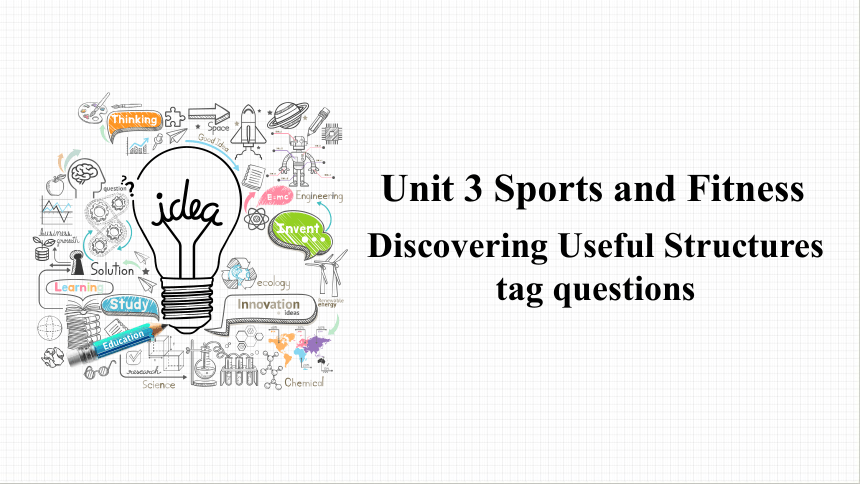 | |
| 格式 | pptx | ||
| 文件大小 | 3.0MB | ||
| 资源类型 | 教案 | ||
| 版本资源 | 人教版(2019) | ||
| 科目 | 英语 | ||
| 更新时间 | 2024-10-09 16:19:06 | ||
图片预览

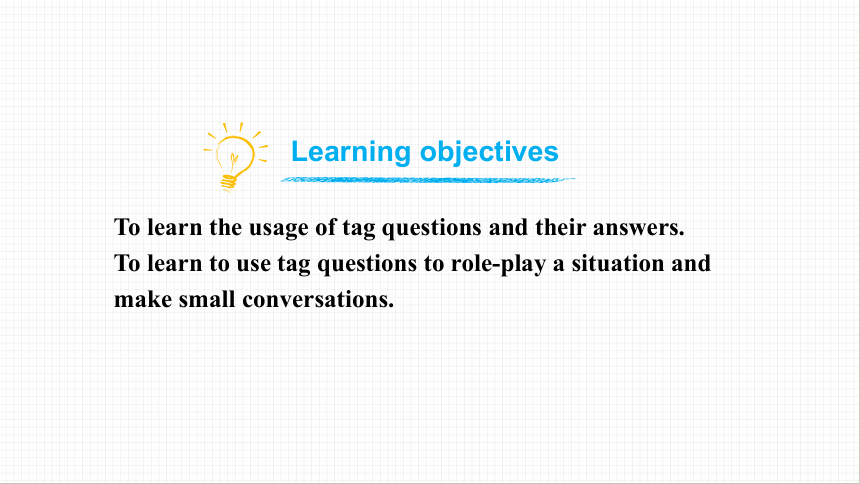
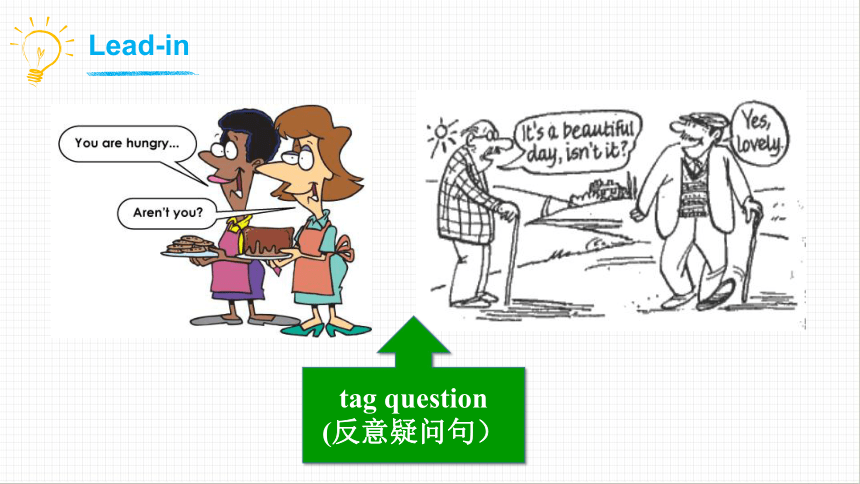
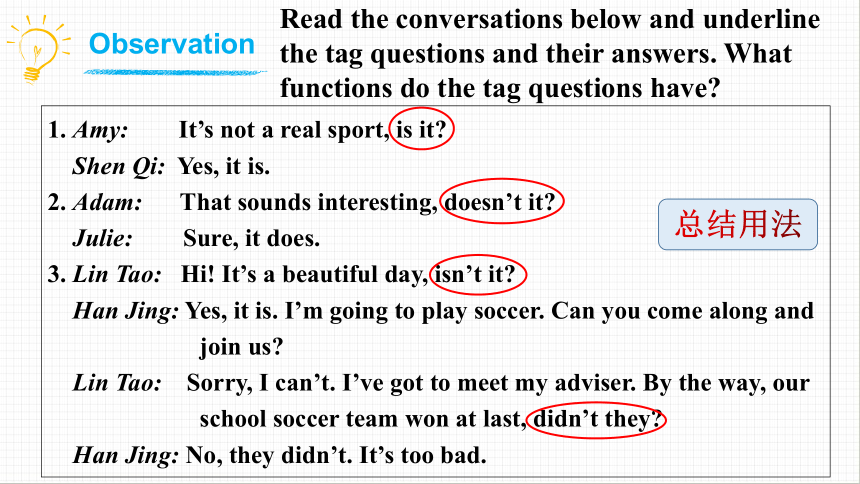
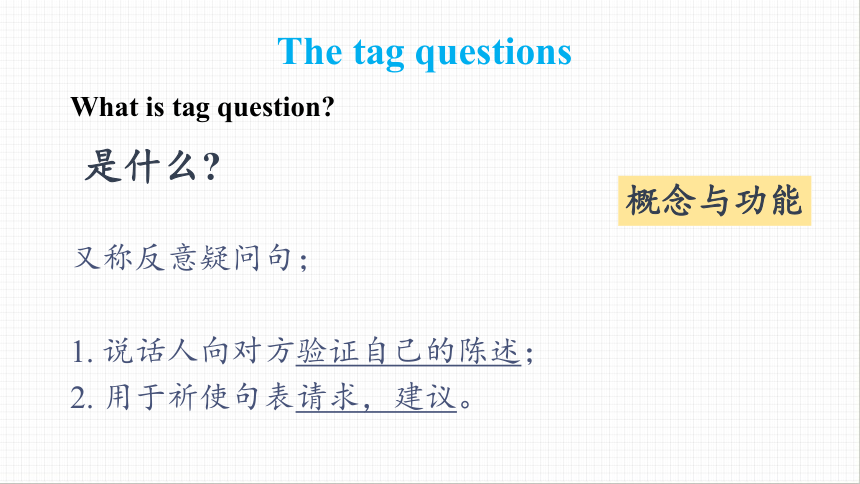
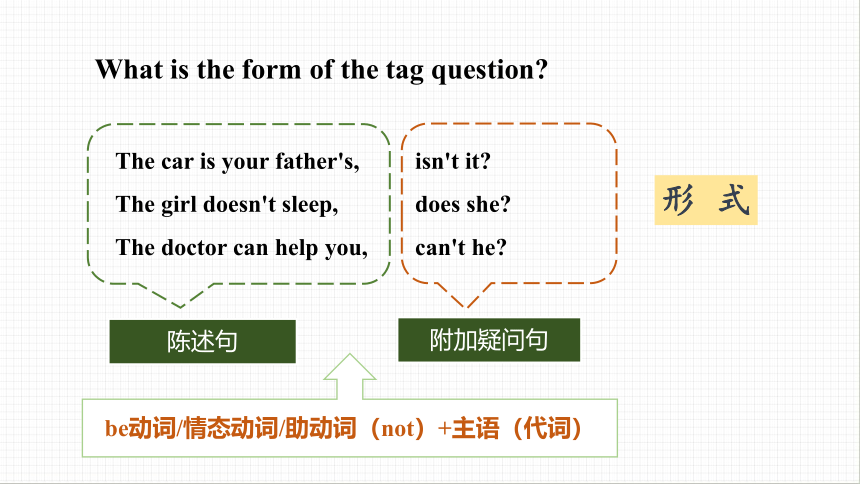
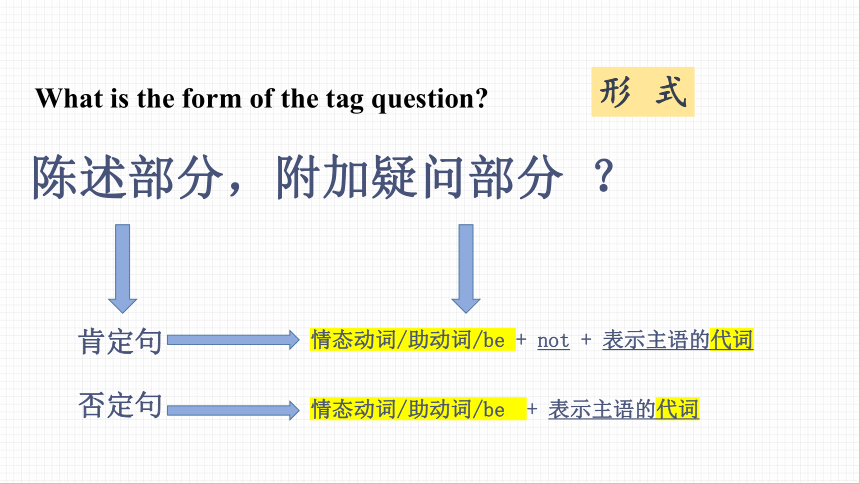
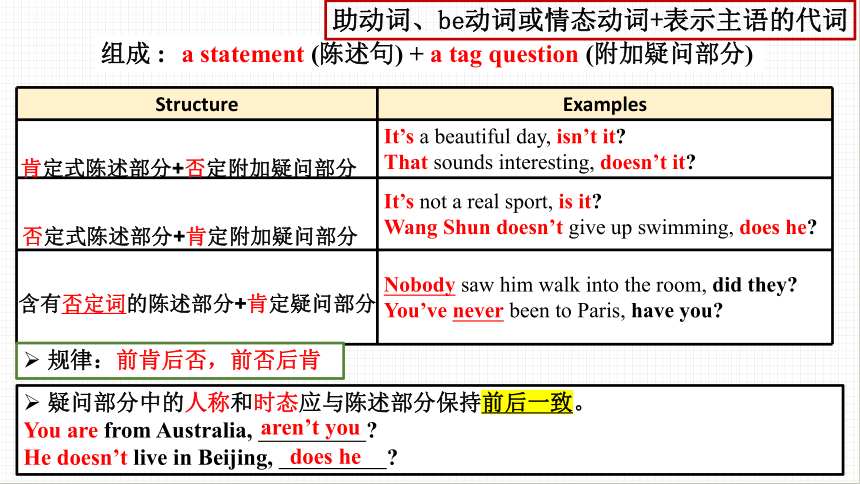
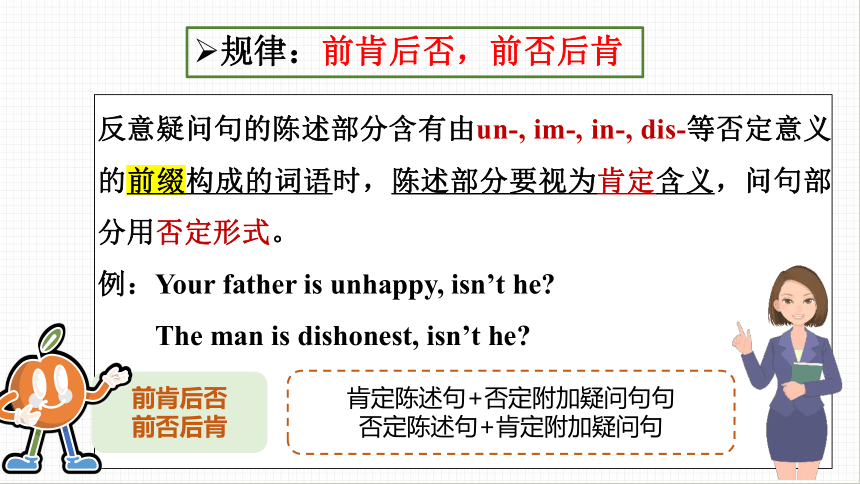
文档简介
(共29张PPT)
Unit 3 Sports and Fitness
Discovering Useful Structures
tag questions
To learn the usage of tag questions and their answers.
To learn to use tag questions to role-play a situation and make small conversations.
Learning objectives
tag question
(反意疑问句)
Lead-in
1. Amy: It’s not a real sport, is it
Shen Qi: Yes, it is.
2. Adam: That sounds interesting, doesn’t it
Julie: Sure, it does.
3. Lin Tao: Hi! It’s a beautiful day, isn’t it
Han Jing: Yes, it is. I’m going to play soccer. Can you come along and join us
Lin Tao: Sorry, I can’t. I’ve got to meet my adviser. By the way, our school soccer team won at last, didn’t they
Han Jing: No, they didn’t. It’s too bad.
Read the conversations below and underline the tag questions and their answers. What functions do the tag questions have
总结用法
Observation
The tag questions
What is tag question
是什么
又称反意疑问句;
1. 说话人向对方验证自己的陈述;
2. 用于祈使句表请求,建议。
概念与功能
What is the form of the tag question
形 式
The car is your father's, isn't it
The girl doesn't sleep, does she
The doctor can help you, can't he
陈述句
附加疑问句
be动词/情态动词/助动词(not)+主语(代词)
What is the form of the tag question
形 式
陈述部分,附加疑问部分 ?
肯定句
情态动词/助动词/be + not + 表示主语的代词
情态动词/助动词/be + 表示主语的代词
否定句
Structure Examples
It’s a beautiful day, isn’t it
That sounds interesting, doesn’t it
It’s not a real sport, is it
Wang Shun doesn’t give up swimming, does he
Nobody saw him walk into the room, did they
You’ve never been to Paris, have you
否定式陈述部分+肯定附加疑问部分
含有否定词的陈述部分+肯定疑问部分
肯定式陈述部分+否定附加疑问部分
规律:前肯后否,前否后肯
a statement (陈述句) + a tag question (附加疑问部分)
疑问部分中的人称和时态应与陈述部分保持前后一致。
You are from Australia,
He doesn’t live in Beijing,
does he
aren’t you
组成 :
助动词、be动词或情态动词+表示主语的代词
反意疑问句的陈述部分含有由un-, im-, in-, dis-等否定意义的前缀构成的词语时,陈述部分要视为肯定含义,问句部分用否定形式。
例:Your father is unhappy, isn’t he
The man is dishonest, isn’t he
规律:前肯后否,前否后肯
前肯后否
前否后肯
肯定陈述句+否定附加疑问句句
否定陈述句+肯定附加疑问句
1. Amy: It’s not a real sport, is it (e-sports)
Shen Qi: Yes, it is.
2. Adam: That sounds interesting, doesn’t it
Julie: Sure, it does.
3. Lin Tao: Hi! It’s a beautiful day, isn’t it
Han Jing: Yes, it is. I’m going to play soccer. Can you come along and join us
Lin Tao: Sorry, I can’t. I’ve got to meet my adviser. By the way, our school
soccer team won at last, didn’t they
Han Jing: No, they didn’t. It’s too bad.
How to answer the tag questions
反意疑问句的回答
根据 回答,事实是肯定的用 ,反之用 。
yes+肯定结构
no+否定结构
实际情况
1. They work hard, don’t they
— 是的,他们工作努力。
— 不,他们工作不努力。
2. They don’t work hard, do they
— 不,他们工作努力。
— 是的,他们工作不努力。
Try to answer the tag questions.
Yes, they do.
No, they don’t.
Yes, they do.
No, they don’t.
根据 回答,事实是肯定的用 ,反之用 。
yes+肯定结构
no+否定结构
实际情况
在前否后肯的结构中,yes译成“不”,no译成“是”。
3. Tom made no answer, did he
---- .
(是的,他没回答。)
4. The film wasn’t very good, was it
---- .
(是的,不怎么好看。)
No, he didn’t.
No, it wasn’t.
1. 陈述句是由“主语+be的形式”构成的,附加问句用“be的形式+主语”。
类 型
The weather is fine, isn’t it
天气很好,不是吗?
2. 陈述句是由“主语+行为动词的各种时态”构成的,附加问句用“助动词do/does/did/have/has/had等+主语”。
You want to be an artist when you grow up, don’t you
当你长大后想你想当一名艺术家,不是吗?
3. 陈述句含有情态动词,附加问句用“情态动词+主语”。
My son can’t work out this question, can he
我儿子不会做这道题,是吗?
下面主要讲解一些特殊情况。
含有特殊主语的附加疑问句
①陈述部分的主语是指人的不定代词, 如: everybody, everyone,somebody, someone, anybody, anyone, nobody, no one, none 等时,其附加问句可以用 they,也可以用he。
Everyone has his own duty, haven't they
每个人都有自己的职责,不是吗
No one knows the truth, do they
没有人知道真相,是吗
②陈述部分的主语是指物的不定代词,如:everything, something, anything, nothing等时,附加问句用it。
Everything goes well as expected, doesn't it
一切按预料的那样进展顺利,是吗
Nothing can stop the wheel of history, can it 没有什么能够阻挡历史车轮的前进,是吗
③陈述部分用不定代词one作主语,附加问句的主语在正式场合用one,在非正式场合可用you。
One can't be too careful, can one/you
人不能太小心,是吗
One should love his (one's) country, shouldn't one/you
人应该热爱自己的祖国,是不是
④当陈述部分的主语是指示代词this, that, these, those时,其后附加问句的主语要用相应的人称代词。即this或that用it指代,these或 those 用they 指代。
This is very important, isn't it 这件事很重要,不是吗
⑤表示“存在”的 there be 结构引导陈述部分时,其后的附加问句仍用虚拟主语 there。
There used to be a temple here , usedn't /didn't there
过去这里有一座庙,是不是
There will be a performance by Jack, won't there
将有一场杰克的演出,是吗
Those are nice, aren't they 那些很好,不是吗
含有特殊谓语动词的附加疑问句
含有情态动词 must
情态动词must在附加问句中的用法,要根据它在陈述部分中的意义决定。
意义 陈述部分 附加问句部分
必须,禁止 You must get up much earlier, 你必须更早一点儿起床, You mustn't speak ill of others , 你不可以说别人的坏话, mustn't you
好不好
must you
好吗
有必要 We must have a discussion this evening, 我们今晚需要讨论一下, needn't we
是不是
一定,肯定 对现在情况的推测 He must be sleeping, 他一定在睡觉, isn't he
是不是
对过去情况的推测 It must have rained last night, 昨晚肯定下雨了, didn't it
是不是
You must have heard about it, 你一定听说过此事, haven't you
是不是
含有否定意义的附加疑问句
陈述部分带有no, never, neither, none, no one, nothing, nobody, nowhere, rarely, hardly, seldom, few, little等表示否定意义的词语时,附加问句一般用肯定式;陈述部分带有含否定前缀或后缀的派生词,如helpless, hopeless, dislike, useless, unable, unfair等时,后面的附加问句仍用否定式。
Your dad seldom smoked at home, did he
你爸爸过去很少在家吸烟,是吗
The boy knows little about his parents, does he
这个男孩不怎么了解他父母的情况,是吗
The man is dishonest, isn't he
这个人不诚实,是吗
She looks unhappy, doesn't she
她看上去不高兴,不是吗
祈使句的附加疑问句
①祈使句后面的附加问句一般用 will you或 won't you。
Have a cup of tea, won't you 请喝杯茶,好吧
Stop that noise, will you 别吵了,行吗
② 以 Let’s 开头的祈使句,后面的附加问句部分要用shall we。而以 Let us 或 Let me 开头的祈使句,其后的附加问句部分应用 will you。因为 Let’s 是邀请含义,包含对方在内,Let us 是请求对方允许,不包含对方。
Let’s go there, shall we 咱们去那儿吧,好吗
Let us go there, will you 让我们去那儿吧,行吗
③若陈述部分是否定的祈使句,附加问句部分除了用will you 外,也可用 can you。
Don't talk any more, can you 别再说话了,好吗
并列句和复合句中的附加疑问句
①若陈述部分是一个主从复合句,附加问句一般要与主句保持一致。
George said that he taught that guy a good lesson, didn't he
乔治说他狠狠地教训了那个家伙一顿,是吗
②当陈述部分是“I'm sure, I'm afraid, I don't think (suppose, expect, imagine, believe等)+宾语从句”结构时,附加问句应与从句保持一致,而且要注意陈述部分的否定转移现象。
I believe he can find her nowhere, can he
我相信他哪里也找不到她,是吗
I expect that they will win the match, won't they
我希望他们会赢得那场比赛,是吗
Complete the conversations with appropriate tag questions or correct answers. Then act them out.
1. A: It’s not going to rain, is it
B: __________. It’s a good day for sports.
A: Then we can play football, ________
B: ___________. We don’t have a ball.
2. A: It’s Sports Day next Thursday, _______
B: You’re right, it is. Let’s ask Xia Lei if she wants to join a team.
A: She likes soccer, __________
B: ______________. But she loves volleyball. She could be in the volleyball team.
No, it isn’t
can’t we
No, we can’t
isn’t it
doesn’t she
No, she doesn’t
Practice
3. A: It’s time for badminton class. Where is the coach He’s late, _______
B: It’s been 10 minutes already. He isn’t coming, _____
A: Cool! We can have a good time. That’s great!
B: Shh!
A: Oh no, he’s right behind me, ______
C: Yes, I am!
isn’t he
is he
isn’t he
Complete the conversations with appropriate tag questions or correct answers. Then act them out.
Add tag questions to the statements.
1. Let’s go and work out in the gym, _________________
2. You don’t take part in a marathon when you’re ill, _________________
3.She’s doing all she can for us in times of stress, so we must back her up, _________________
4. Henry thinks you are cheating your friends, _________________
5. Andy’s never been anything but a friendly guy, _________________
6. There’s going to be a talk on wellness and fitness next week, _________________
shall we
do you
mustn’t we
doesn’t he
has he
isn’t there
Use tag questions to role-play one of the situations below.
Event
Address
Date
Conversation 1
A: The Sports Day is coming soon, isn’t it
B: Yes, it is. They need some volunteers, don’t they
A: Yes, they do. We should volunteer, shouldn’t we
B: Yes, we should.
Conversation 2
A: Wow, Chen Liang can jump really high, can’t he
B: He sure can! We are going to win, aren’t we
A: I think so. The other team must score 10 points in two minutes. It can’t be done, can it
B: I don’t think so. I’ll be right back ... Oh no! The other team didn’t win, did they
A: I’m afraid so!
Sample
Add tag questions to the statements.
1. Let’s go and work out in the gym, ____________
2. You don’t take part in a marathon when you’re ill, ____________
3. Turn off the TV, ____________________
4. She’s doing all she can for us in times of stress, so we must back her up,
____________
5. Henry thinks you are cheating your friends, ____________
6. Andy’s never been anything but a friendly guy, ____________
7. Emily had to cut out sugar from her diet as her doctor suggested,
____________
8. There’s going to be a talk on wellness and fitness next week,
____________
shall we
do you
mustn’t we
will/won’t/can/can’t you
doesn’t he
has he
didn’t she
isn’t there
Work Book
Complete the conversation with appropriate tag questions.
Tom: Mum, I can have one more burger, ____________
Mum: No, you can’t. You’ve already had two! But you can have some yoghurt. Oh, what’s that noise
Dad: It isn’t a storm coming, ____________
Tom: Yes, it is. But it’s on TV! Dad, come and see, _______________
Dad: What movie are you watching
Tom: The Day after Tomorrow.
Mum: Let’s watch it together, ____________ Family Time!
Dad: Good idea!
can’t I
is it
will/won’t you
shall we
Work Book
Work Book
Complete the questionnaire for Chris.
A: Hi Chris! My name is Steve. I’m a trainer here at the gym. So you’ve just filled out our questionnaire, ____________
B: Yes. It’s nice to meet you, Steve.
A: It’s good to meet you, too! OK, let me take a look at your answers. Hmm ... So you’ve never worked out in a gym before, ____________
B: No, I haven’t, Steve. Embarrassing (让人尴尬的), but true.
A: Oh, don’t be embarrassed! It’s never too late to start. But I have to ask ... You think working out for ... hours a week is enough, ____________
...
haven’t you
have you
don’t you
反意疑问句
形式
特殊情况
前肯后否
前否后肯
肯定的祈使句+will you/won't you
否定的祈使句+will you?
Let's…+shall we?/Let us…+will you?
01
02
03
04
05
06
陈述部分有表示否定意义的词
陈述部分有带否定前缀的词
陈述部分的主语是everything,anything,nothing等
陈述部分含有there be
陈述部分的主语是everyone,anyone等
陈述部分为复合句
Summary
Finish the exercise on P85, Activity 4.
Homework
Unit 3 Sports and Fitness
Discovering Useful Structures
tag questions
To learn the usage of tag questions and their answers.
To learn to use tag questions to role-play a situation and make small conversations.
Learning objectives
tag question
(反意疑问句)
Lead-in
1. Amy: It’s not a real sport, is it
Shen Qi: Yes, it is.
2. Adam: That sounds interesting, doesn’t it
Julie: Sure, it does.
3. Lin Tao: Hi! It’s a beautiful day, isn’t it
Han Jing: Yes, it is. I’m going to play soccer. Can you come along and join us
Lin Tao: Sorry, I can’t. I’ve got to meet my adviser. By the way, our school soccer team won at last, didn’t they
Han Jing: No, they didn’t. It’s too bad.
Read the conversations below and underline the tag questions and their answers. What functions do the tag questions have
总结用法
Observation
The tag questions
What is tag question
是什么
又称反意疑问句;
1. 说话人向对方验证自己的陈述;
2. 用于祈使句表请求,建议。
概念与功能
What is the form of the tag question
形 式
The car is your father's, isn't it
The girl doesn't sleep, does she
The doctor can help you, can't he
陈述句
附加疑问句
be动词/情态动词/助动词(not)+主语(代词)
What is the form of the tag question
形 式
陈述部分,附加疑问部分 ?
肯定句
情态动词/助动词/be + not + 表示主语的代词
情态动词/助动词/be + 表示主语的代词
否定句
Structure Examples
It’s a beautiful day, isn’t it
That sounds interesting, doesn’t it
It’s not a real sport, is it
Wang Shun doesn’t give up swimming, does he
Nobody saw him walk into the room, did they
You’ve never been to Paris, have you
否定式陈述部分+肯定附加疑问部分
含有否定词的陈述部分+肯定疑问部分
肯定式陈述部分+否定附加疑问部分
规律:前肯后否,前否后肯
a statement (陈述句) + a tag question (附加疑问部分)
疑问部分中的人称和时态应与陈述部分保持前后一致。
You are from Australia,
He doesn’t live in Beijing,
does he
aren’t you
组成 :
助动词、be动词或情态动词+表示主语的代词
反意疑问句的陈述部分含有由un-, im-, in-, dis-等否定意义的前缀构成的词语时,陈述部分要视为肯定含义,问句部分用否定形式。
例:Your father is unhappy, isn’t he
The man is dishonest, isn’t he
规律:前肯后否,前否后肯
前肯后否
前否后肯
肯定陈述句+否定附加疑问句句
否定陈述句+肯定附加疑问句
1. Amy: It’s not a real sport, is it (e-sports)
Shen Qi: Yes, it is.
2. Adam: That sounds interesting, doesn’t it
Julie: Sure, it does.
3. Lin Tao: Hi! It’s a beautiful day, isn’t it
Han Jing: Yes, it is. I’m going to play soccer. Can you come along and join us
Lin Tao: Sorry, I can’t. I’ve got to meet my adviser. By the way, our school
soccer team won at last, didn’t they
Han Jing: No, they didn’t. It’s too bad.
How to answer the tag questions
反意疑问句的回答
根据 回答,事实是肯定的用 ,反之用 。
yes+肯定结构
no+否定结构
实际情况
1. They work hard, don’t they
— 是的,他们工作努力。
— 不,他们工作不努力。
2. They don’t work hard, do they
— 不,他们工作努力。
— 是的,他们工作不努力。
Try to answer the tag questions.
Yes, they do.
No, they don’t.
Yes, they do.
No, they don’t.
根据 回答,事实是肯定的用 ,反之用 。
yes+肯定结构
no+否定结构
实际情况
在前否后肯的结构中,yes译成“不”,no译成“是”。
3. Tom made no answer, did he
---- .
(是的,他没回答。)
4. The film wasn’t very good, was it
---- .
(是的,不怎么好看。)
No, he didn’t.
No, it wasn’t.
1. 陈述句是由“主语+be的形式”构成的,附加问句用“be的形式+主语”。
类 型
The weather is fine, isn’t it
天气很好,不是吗?
2. 陈述句是由“主语+行为动词的各种时态”构成的,附加问句用“助动词do/does/did/have/has/had等+主语”。
You want to be an artist when you grow up, don’t you
当你长大后想你想当一名艺术家,不是吗?
3. 陈述句含有情态动词,附加问句用“情态动词+主语”。
My son can’t work out this question, can he
我儿子不会做这道题,是吗?
下面主要讲解一些特殊情况。
含有特殊主语的附加疑问句
①陈述部分的主语是指人的不定代词, 如: everybody, everyone,somebody, someone, anybody, anyone, nobody, no one, none 等时,其附加问句可以用 they,也可以用he。
Everyone has his own duty, haven't they
每个人都有自己的职责,不是吗
No one knows the truth, do they
没有人知道真相,是吗
②陈述部分的主语是指物的不定代词,如:everything, something, anything, nothing等时,附加问句用it。
Everything goes well as expected, doesn't it
一切按预料的那样进展顺利,是吗
Nothing can stop the wheel of history, can it 没有什么能够阻挡历史车轮的前进,是吗
③陈述部分用不定代词one作主语,附加问句的主语在正式场合用one,在非正式场合可用you。
One can't be too careful, can one/you
人不能太小心,是吗
One should love his (one's) country, shouldn't one/you
人应该热爱自己的祖国,是不是
④当陈述部分的主语是指示代词this, that, these, those时,其后附加问句的主语要用相应的人称代词。即this或that用it指代,these或 those 用they 指代。
This is very important, isn't it 这件事很重要,不是吗
⑤表示“存在”的 there be 结构引导陈述部分时,其后的附加问句仍用虚拟主语 there。
There used to be a temple here , usedn't /didn't there
过去这里有一座庙,是不是
There will be a performance by Jack, won't there
将有一场杰克的演出,是吗
Those are nice, aren't they 那些很好,不是吗
含有特殊谓语动词的附加疑问句
含有情态动词 must
情态动词must在附加问句中的用法,要根据它在陈述部分中的意义决定。
意义 陈述部分 附加问句部分
必须,禁止 You must get up much earlier, 你必须更早一点儿起床, You mustn't speak ill of others , 你不可以说别人的坏话, mustn't you
好不好
must you
好吗
有必要 We must have a discussion this evening, 我们今晚需要讨论一下, needn't we
是不是
一定,肯定 对现在情况的推测 He must be sleeping, 他一定在睡觉, isn't he
是不是
对过去情况的推测 It must have rained last night, 昨晚肯定下雨了, didn't it
是不是
You must have heard about it, 你一定听说过此事, haven't you
是不是
含有否定意义的附加疑问句
陈述部分带有no, never, neither, none, no one, nothing, nobody, nowhere, rarely, hardly, seldom, few, little等表示否定意义的词语时,附加问句一般用肯定式;陈述部分带有含否定前缀或后缀的派生词,如helpless, hopeless, dislike, useless, unable, unfair等时,后面的附加问句仍用否定式。
Your dad seldom smoked at home, did he
你爸爸过去很少在家吸烟,是吗
The boy knows little about his parents, does he
这个男孩不怎么了解他父母的情况,是吗
The man is dishonest, isn't he
这个人不诚实,是吗
She looks unhappy, doesn't she
她看上去不高兴,不是吗
祈使句的附加疑问句
①祈使句后面的附加问句一般用 will you或 won't you。
Have a cup of tea, won't you 请喝杯茶,好吧
Stop that noise, will you 别吵了,行吗
② 以 Let’s 开头的祈使句,后面的附加问句部分要用shall we。而以 Let us 或 Let me 开头的祈使句,其后的附加问句部分应用 will you。因为 Let’s 是邀请含义,包含对方在内,Let us 是请求对方允许,不包含对方。
Let’s go there, shall we 咱们去那儿吧,好吗
Let us go there, will you 让我们去那儿吧,行吗
③若陈述部分是否定的祈使句,附加问句部分除了用will you 外,也可用 can you。
Don't talk any more, can you 别再说话了,好吗
并列句和复合句中的附加疑问句
①若陈述部分是一个主从复合句,附加问句一般要与主句保持一致。
George said that he taught that guy a good lesson, didn't he
乔治说他狠狠地教训了那个家伙一顿,是吗
②当陈述部分是“I'm sure, I'm afraid, I don't think (suppose, expect, imagine, believe等)+宾语从句”结构时,附加问句应与从句保持一致,而且要注意陈述部分的否定转移现象。
I believe he can find her nowhere, can he
我相信他哪里也找不到她,是吗
I expect that they will win the match, won't they
我希望他们会赢得那场比赛,是吗
Complete the conversations with appropriate tag questions or correct answers. Then act them out.
1. A: It’s not going to rain, is it
B: __________. It’s a good day for sports.
A: Then we can play football, ________
B: ___________. We don’t have a ball.
2. A: It’s Sports Day next Thursday, _______
B: You’re right, it is. Let’s ask Xia Lei if she wants to join a team.
A: She likes soccer, __________
B: ______________. But she loves volleyball. She could be in the volleyball team.
No, it isn’t
can’t we
No, we can’t
isn’t it
doesn’t she
No, she doesn’t
Practice
3. A: It’s time for badminton class. Where is the coach He’s late, _______
B: It’s been 10 minutes already. He isn’t coming, _____
A: Cool! We can have a good time. That’s great!
B: Shh!
A: Oh no, he’s right behind me, ______
C: Yes, I am!
isn’t he
is he
isn’t he
Complete the conversations with appropriate tag questions or correct answers. Then act them out.
Add tag questions to the statements.
1. Let’s go and work out in the gym, _________________
2. You don’t take part in a marathon when you’re ill, _________________
3.She’s doing all she can for us in times of stress, so we must back her up, _________________
4. Henry thinks you are cheating your friends, _________________
5. Andy’s never been anything but a friendly guy, _________________
6. There’s going to be a talk on wellness and fitness next week, _________________
shall we
do you
mustn’t we
doesn’t he
has he
isn’t there
Use tag questions to role-play one of the situations below.
Event
Address
Date
Conversation 1
A: The Sports Day is coming soon, isn’t it
B: Yes, it is. They need some volunteers, don’t they
A: Yes, they do. We should volunteer, shouldn’t we
B: Yes, we should.
Conversation 2
A: Wow, Chen Liang can jump really high, can’t he
B: He sure can! We are going to win, aren’t we
A: I think so. The other team must score 10 points in two minutes. It can’t be done, can it
B: I don’t think so. I’ll be right back ... Oh no! The other team didn’t win, did they
A: I’m afraid so!
Sample
Add tag questions to the statements.
1. Let’s go and work out in the gym, ____________
2. You don’t take part in a marathon when you’re ill, ____________
3. Turn off the TV, ____________________
4. She’s doing all she can for us in times of stress, so we must back her up,
____________
5. Henry thinks you are cheating your friends, ____________
6. Andy’s never been anything but a friendly guy, ____________
7. Emily had to cut out sugar from her diet as her doctor suggested,
____________
8. There’s going to be a talk on wellness and fitness next week,
____________
shall we
do you
mustn’t we
will/won’t/can/can’t you
doesn’t he
has he
didn’t she
isn’t there
Work Book
Complete the conversation with appropriate tag questions.
Tom: Mum, I can have one more burger, ____________
Mum: No, you can’t. You’ve already had two! But you can have some yoghurt. Oh, what’s that noise
Dad: It isn’t a storm coming, ____________
Tom: Yes, it is. But it’s on TV! Dad, come and see, _______________
Dad: What movie are you watching
Tom: The Day after Tomorrow.
Mum: Let’s watch it together, ____________ Family Time!
Dad: Good idea!
can’t I
is it
will/won’t you
shall we
Work Book
Work Book
Complete the questionnaire for Chris.
A: Hi Chris! My name is Steve. I’m a trainer here at the gym. So you’ve just filled out our questionnaire, ____________
B: Yes. It’s nice to meet you, Steve.
A: It’s good to meet you, too! OK, let me take a look at your answers. Hmm ... So you’ve never worked out in a gym before, ____________
B: No, I haven’t, Steve. Embarrassing (让人尴尬的), but true.
A: Oh, don’t be embarrassed! It’s never too late to start. But I have to ask ... You think working out for ... hours a week is enough, ____________
...
haven’t you
have you
don’t you
反意疑问句
形式
特殊情况
前肯后否
前否后肯
肯定的祈使句+will you/won't you
否定的祈使句+will you?
Let's…+shall we?/Let us…+will you?
01
02
03
04
05
06
陈述部分有表示否定意义的词
陈述部分有带否定前缀的词
陈述部分的主语是everything,anything,nothing等
陈述部分含有there be
陈述部分的主语是everyone,anyone等
陈述部分为复合句
Summary
Finish the exercise on P85, Activity 4.
Homework
